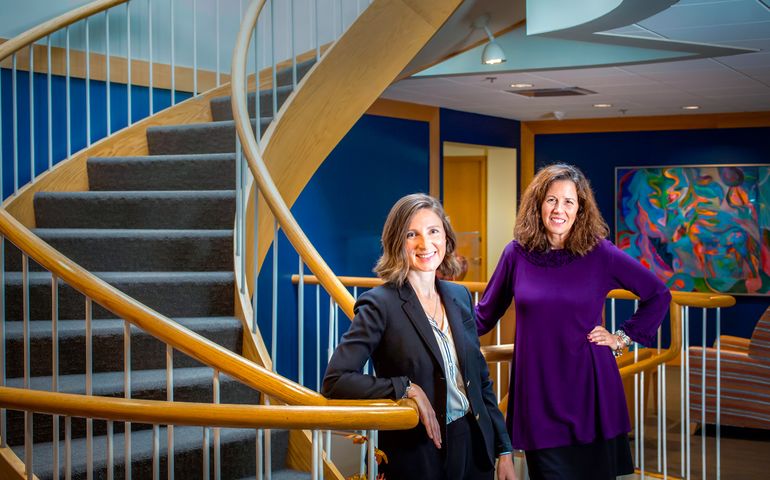
Processing Your Payment
Please do not leave this page until complete. This can take a few moments.
- News
-
Editions
View Digital Editions
Biweekly Issues
- December 15, 2025
- December 1, 2025
- Nov. 17, 2025
- November 03, 2025
- October 20, 2025
- October 6, 2025
- + More
Special Editions
- Lists
- Viewpoints
-
Our Events
Event Info
Award Honorees
- Calendar
- Biz Marketplace
Hire calling: Maine law firms ramp up attorney recruiting
 Photo / Tim Greenway
Lindsay Leone, left, and Joan Fortin of Bernstein Shur will split recruiting duties as Fortin prepares to succeed Pat Scully as CEO on Jan. 1. Fortin will focus on experienced, lateral hires, while Leone will concentrate on summer and entry-level associates.
Photo / Tim Greenway
Lindsay Leone, left, and Joan Fortin of Bernstein Shur will split recruiting duties as Fortin prepares to succeed Pat Scully as CEO on Jan. 1. Fortin will focus on experienced, lateral hires, while Leone will concentrate on summer and entry-level associates.
Maine law firms of all sizes are hiring, and ramping up recruiting of entry-level and seasoned attorneys.
Strategies range from more networking and outreach rather than just on-campus interviewing, and screening candidates for their “fit” into a firm’s culture. Most have their own recruiting or hiring committees, but enlist external recruiters when seeking to fill specific senior positions.
Bernstein Shur, Maine’s largest law firm with 102 attorneys in Portland, 18 in Manchester, N.H., and one in Augusta, is leading the way with two in-house power recruiters in a new setup approved by the board in October.
Joan Fortin, who has overseen attorney recruiting at the firm for the past 20 years and will succeed Pat Scully as CEO in January, will shift her recruiting focus to experienced, lateral hires, while senior associate Lindsay Leone will spearhead summer associate and entry-level hiring.
“If you think about what a law firm is,” Fortin says, “we don’t sell things or widgets. It’s people, it’s a relationship business, and so the quality of our hires is extremely important. As CEO I’m still going to be very involved in the hiring.”
Leone, who joined Bernstein Shur in early 2017 from Boston firm Mintz Levin, vets every summer applicant as she would for any staff attorney role.
“When we think about how they would work within our firm,” she says, “it’s always with that long-term view of their potential to generate clients and business. That’s something we look for right from the beginning.”
Of the firm’s current attorneys, 26% were summer associates.
Large firms are hiring
As Maine’s only law school, the University of Maine School of Law in Portland is fertile ground for recruiters from law firms and other employers.
Ann Parrent, the new director of career services, says the school has had strong on-campus interview program over the past few years, with consistent participation by around 15 law firms as well as corporate legal departments and governmental and nonprofit employers.
“We also regularly post opportunities and collect applications for law firms and other employers who do not participate in on-campus interviewing,” she adds.
That may become more challenging for some firms now that the Washington, D.C.-based National Association for Law Placement has freed up law schools to set their own policies and procedures.
While some Maine law firms saw fewer applications for summer 2020 associate positions, many have made their hires and are sticking to their traditional class sizes. That includes Bernstein Shur with three associates signed on for next summer, Pierce Atwood with two hired for Portland and one for Providence, R.I; and Preti Flaherty with two summer associates for Portland.
Pierce Atwood’s Katy Rand, the partner who spearheads attorney recruiting, says about a third of the firm’s attorneys had been summer associates. Out of her summer 2002 class, all four were promoted to partner at the same time and are still with the firm.
More recently, seven new associates joined Pierce Atwood in September — in the business, litigation, environmental, and real estate practice groups — including five laterals. Two former summer associates are also set to start in September 2020.
Because the vast majority of Pierce Atwood summer associates end up getting job offers with the firm, Rand says it’s important for them to get to know as many lawyers as possible early on.
“We really respect each other’s talents and opinions here, so the hope is that we will attract candidates that will help perpetuate that culture,” she says. While on-campus interviewing used to be a bigger part of the recruiting, she says the firm now does so only at schools in the region, including Boston and Maine.
It also gets applications from candidates across the country, mainly from individuals with a connection to Maine.
On a similar note, Eaton Peabody encourages applications from students from away, including a summer associate hired for next year who attends a law school in the western United States but is originally from Maine.
Eaton Peabody’s Ryan Dumais, who co-chairs the firm’s hiring committee from Augusta, says the firm recruits for entry-level attorney hires on a three- to five-year horizon. That’s partly a function of the summer program, and partly a function of the traditional, one-year judicial clerkships after graduation.
While Eaton Peabody normally takes on two summer associates, this past summer it had three, two of whom will join the firm in fall 2020 after finishing one-year judicial clerkships.
“We don’t hire for attrition,” Dumais says. “We hire for specific needs.” He also says the recruiting committee tweaks its approach when needed, underscoring that “we try not to be lock-step about it.”
At Preti Flaherty, recruitment committee chair Jeffrey Talbert says the firm sometimes enlists external recruiters to help find candidates for specific positions. He says the hardest people to find are those with an established book of business and are willing to relocate. But he says the firm has overcome that hurdle by being transparent about how it operates, and the fact that it’s a large firm that can handle a wide range of cases.
“We’re also a meritocracy,” Talbert says, “so people understand that if they work hard they’ll do well and advance at the firm. That’s been overall very helpful, especially with folks looking for opportunities to grow.”
Small firms with big ambitions
Murray Plumb & Murray, a 16-attorney firm with offices on Pearl Street in Portland, recently hired Katherine Krakowka as of counsel on its three-person bankruptcy team co-chaired by Andrew Helman and Kelly McDonald.
McDonald also chairs the firm’s hiring committee, and says the firm likes to bring on summer associates it sees fitting in for the long term.
“We really want to bring in a summer associate who is going to succeed and who we’re going to like, and at the end of that time we’re going to make them an offer for post-graduation, and then will stay here and make partner,” he says. He likes to joke about the comparison to John Grisham’s novel “The Firm” or the Eagles’ song “Hotel California,” but adds: “I won’t use that metaphor too often because it scares people."

On a more serious note, McDonald says the firm hasn’t yet found a summer associate for 2020 — sometimes they’re snapped up by larger rivals — but is resigned to the possibility it may not find one.
With any new hire the firm looks for high-quality lawyers it sees fitting into the family-like culture, partly a function of its decision to stay under 25 lawyers.
“That small size means that here, first-year associates are going to client meetings,” he says. “They’re not part of a six-lawyer team where they’re reporting to a senior associate who’s reporting to a junior partner who’s reporting to a senior partner, who’s actually talking to the client.” He also highlights diversity as an “explicit priority, because we’re better off if we’re not just a bunch of white men.”
A few blocks away at civil litigation firm Thompson Bowie & Hatch LLC, hiring partner Robert Hatch says he hires most if not all new associates from judicial clerkships and when interviewing summer associate candidates “we look for the good people, and then we teach them to be good lawyers.”
Hatch says the firm has a zero attrition rate for lawyers and staff, and wouldn’t be surprised to grow beyond the current 15 attorneys, particularly in the areas of immigration, mediation and professional liability defense. “Some of our practices are growing, and having more hands would be very beneficial to us.”
Three-year plan
Back at Bernstein Shur, Fortin says the firm looks to hire lawyers who have had work and different life experiences before going to law school.
That includes former paralegal Julia MacDonald and Elliot Brake, who was working as a program assistant at Portland nonprofit Preble Street when he first met Fortin and mentioned he was studying for the Law School Admission Test.
“Law school was still years away, but she gave me her card and I kept it,” he says. He later applied for and was accepted as a summer associate in 2019, as well as MacDonald. Both, now in their late 20s and in their third and final year at UMaine Law, will spend the next year in judicial clerkships and then start full-time at Bernstein Shur in fall 2022.
“It feels weird to do that,” says MacDonald, “but it feels really good know what I’ll be doing. It takes the pressure off.”
Mainebiz web partners
Related Content

The Giving Guide
The Giving Guide helps nonprofits have the opportunity to showcase and differentiate their organizations so that businesses better understand how they can contribute to a nonprofit’s mission and work.
Learn More
Work for ME
Work for ME is a workforce development tool to help Maine’s employers target Maine’s emerging workforce. Work for ME highlights each industry, its impact on Maine’s economy, the jobs available to entry-level workers, the training and education needed to get a career started.
Learn More
Groundbreaking Maine
Whether you’re a developer, financer, architect, or industry enthusiast, Groundbreaking Maine is crafted to be your go-to source for valuable insights in Maine’s real estate and construction community.
Learn more-
The Giving Guide
The Giving Guide helps nonprofits have the opportunity to showcase and differentiate their organizations so that businesses better understand how they can contribute to a nonprofit’s mission and work.
-
Work for ME
Work for ME is a workforce development tool to help Maine’s employers target Maine’s emerging workforce. Work for ME highlights each industry, its impact on Maine’s economy, the jobs available to entry-level workers, the training and education needed to get a career started.
-
Groundbreaking Maine
Whether you’re a developer, financer, architect, or industry enthusiast, Groundbreaking Maine is crafted to be your go-to source for valuable insights in Maine’s real estate and construction community.
ABOUT
NEW ENGLAND BUSINESS MEDIA SITES
No articles left
Get access now
In order to use this feature, we need some information from you. You can also login or register for a free account.
By clicking submit you are agreeing to our cookie usage and Privacy Policy
Already have an account? Login
Already have an account? Login
Want to create an account? Register
Get access now
In order to use this feature, we need some information from you. You can also login or register for a free account.
By clicking submit you are agreeing to our cookie usage and Privacy Policy
Already have an account? Login
Already have an account? Login
Want to create an account? Register











0 Comments